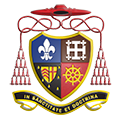If you talk to him in his language, that goes to his heart.
Nelson Mandela
Introduction
In St Bonaventure’s we celebrate languages and in KS3 and KS4 all pupils learn at least one language for 2 hours per week. We offer French, German and Spanish in all Key Stages and provide the opportunity for pupils to take examinations in home languages wherever possible. We are very proud of all our pupils who speak several languages and value their linguistic expertise.
Language lessons offer pupils the opportunity to develop listening, reading, speaking and writing skills in a creative environment in a range of ways including games, presentations, video clips, pair work, group work, projects and on-line activities. Pupils are encouraged to speak as much target language as possible in lessons and topics and materials are chosen to reflect the interests of the young people we teach.
The study of Spanish is seen as an important part of our pupils’ education as languages are part of the cultural richness of our society and the world in which we live and work. Learning languages contributes to mutual understanding, a sense of global citizenship and personal fulfilment. Pupils learn to appreciate different countries, cultures, communities and people. The ability to understand and communicate in another language is a lifelong skill for education, employment and leisure in this country and throughout the world. In addition to this, it strengthens the understanding and command of the English language.
Our Spanish lessons offer pupils the opportunity to develop listening, reading, speaking and writing skills in a creative environment in a range of ways including games, presentations, video clips, pair work, group work, projects and on-line activities. Students have the opportunity to speaking with a native speaking Foreign Language Assistant and our bi-lingual students are encouraged to accomplish a qualification in their native language.
Curriculum
KS3
Topics covered include:
| Year 7 | Year 8 | Year 9 |
| Introductions Where I live Sports & hobbies School Life Family & Descriptions Art & Artists |
Food & Shopping Poetry In my Town |
Health & Fitness Festivals & Holidays Media Project learning including case studies of target language cities, target language films etc |
KS4
From September 2016 we will be following the new AQA GCSE Spanish specification.
Topics covered will include:
| Y10 | Y11 |
Identity and Culture:
Local, National, International and Global Areas of Interests
|
Current and future study and Employment:
|
Grammar, skills and strategies
Across all Key Stages pupils will gain a variety of literacy strategies, practice skills in listening, speaking, reading and writing in the target language, and build on their knowledge of grammar and vocabulary. Pupils will learn how to:
- understand and produce information on a variety of topics, both of personal interest as well as local and global interest, including opinions, justifications and arguments
- understanding and producing information in the past, present and future tenses
- use accurate grammar, spelling and punctuation.
- understand and respond to a variety of spoken and written instructions in the target language
- understand and respond to spoken and written information in a variety of forms, including songs, stories, poems, letters, articles, advertisements, pictures, posters
- speak confidently in the target language with an understanding of the important of pronunciation, intonation and appropriate forms of address
- translate meaning to and from the target language
KS5
From September 2016 we will be following the new AQA A-level Spanish specification
Topics covered will include:
| Y12 | Y13 |
Aspects of Spanish society:
Artistic culture in the Hispanic world:
Film analysis “Todo sobre mi madre” Almodovar |
Multiculturalism in Spanish society:
Aspects of political life in the Hispanic world:
Book analysis: novel from twentieth century Spanish literature |
Grammar, skills and strategies
Across all Key Stages pupils will gain a variety of literacy strategies, practice skills in listening, speaking, reading and writing in the target language, and build on their knowledge of grammar and vocabulary. Pupils will learn how to:
- Articles Definite and indefinite
- Adjectives Agreement Position Apocopation
- Comparative and superlative
- Demonstrative
- Possessive
- Interrogative and exclamatory
- Relative
- Numerals Cardinal/ Ordinal 1–10
- Expression of time and date
- Adverbs Formation of adverbs in -mente
- Comparative and superlative
- Use of adjectives as adverbs
- Interrogative
- Quantifiers/intensifiers
- Pronouns Subject Object: direct and indirect
- Position and order Relative
- Demonstrative
- Indefinite
- Possessive
- Expression of possession
- Verbs Regular/irregular conjugations
- Use of tenses: present , preterite, imperfect, future, conditional, perfect, future perfect conditional perfect, pluperfect infinitive, the gerund and the past participle Verbal paraphrases and their uses, subjunctive, conditional sentences, reflexive
- Modes of address (tú, usted; vos)
- Prepositions
- por and para

